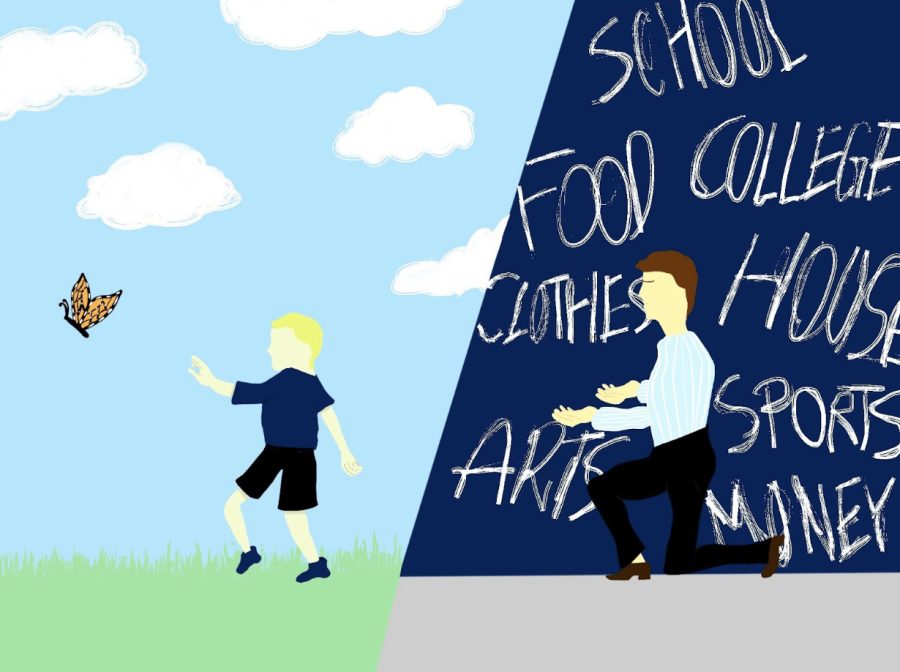Give credit where it’s due
Parents spend an abundant amount of time and money raising their children, from extracurriculars to education. The Sidekick staff writer Nathan Cheng thinks children should pay more attention to their parents’ efforts.
January 21, 2022
No parent can deny that the obligations they assume when becoming a parent are expensive and difficult.
Prior to having children, one likely never has a need to create and maintain bank accounts for children’s college funds, drive children to extracurriculars or spend time helping the next generation solve problems when they have no shortage of their own. But the moment one becomes a parent, they are bombarded with obligations that must be fulfilled for the welfare of their children.
As students, parents are of exceeding importance to our current and future situations. With many of us participating in school or extracurriculars and seeing college on the horizon, it is clear that we will need our parents’ help if we hope to one day achieve the goals we seek or live the lives we see for ourselves. That is not to mention the reason we can even have an opportunity to look to such things is the sacrifices of time and effort made by our parents to raise us.
Yet, despite this, many of us perhaps do not see the true gravity of these expenses made on our behalf.
“We don’t really appreciate a lot of the little things [that our parents give us],” CHS junior wrestler Isaiah Francis said. “If it weren’t for [my parents], I wouldn’t be able to wrestle. I think that people can just get caught up in the moment and forget about their parents or what they do.”
With parental support, students are able to do things many others do not have the privilege to enjoy, whether it be to attend school or compete in sports. But it is precisely when doing these things that we fail to see who made it possible to be there.
“When I’m angry or distracted with something or if I’m passionate about something I tend to forget some things that are valuable to me,” Francis said. “Say [I] get to travel somewhere to wrestle. I sometimes forget who paid for my ticket and I’m just excited to wrestle and go out somewhere far.”
But this idea can also be true in another sense. It is no secret that parents may make children do things they do not want to do. Requiring them to meet academic standards is likely the most obvious example. School is a large part of one’s life when they are young. As such, it is something directly provided by parents through both logistical and financial means. But while we attend school, we may very well find that we frequently wish we were somewhere else.
It is during these times when classes are difficult that we, as students, may find it hard to appreciate the people who have provided them for us.
While it is true that parents are legally required to provide certain things for their children, just because they are required to provide does not mean that such actions are not worthy of our gratitude. The legal provisions required of parents will often involve parents going out of their way in the interest of their children and that, by itself, should always demand gratitude, regardless of whether it is just them fulfilling their legal obligations or not.
Students may also struggle to show gratitude to their parents simply because they might not know how. There are, of course, obvious ways to express gratitude, but beyond a simple “thank you,” students may feel that they have difficulty showing it rather than simply saying it.
“Of course, I appreciate my parents,” CHS junior Prunav Bushigampala said. “But I don’t feel there is a lot I can do. I can say ‘thank you,’ but it almost feels insincere because I can’t prove it; I don’t think my words mean anything.”
Though it may not feel significant, saying thank you can have a much deeper and profound effect than one might initially expect. So even if it feels insincere, the fact that it was said is still meaningful.
But the gratitude should still go deeper. Giving small gifts, cooking dinner for a night, writing gratitude letters or even simply trying to be more enthusiastic around your parents are all simple ways to show gratitude.
There is no point in one’s life in which their parents will not be important. Our parents shape us into who we are. If we wish to show our parents that they made us into good people, it is imperative for us to give credit where it is due.
Follow Nathan (@WalterBotell) and @CHSCampusNews on Twitter











